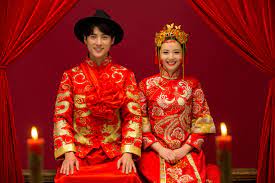Many factors responsible for more people tying knot than last year

There was a sizable uptick in the number of new marriages registered last year in China after nine straight years of decline, amid concerns about falling birthrates and a growing aging population.
Demographers said the rebound was due to a mix of factors, including the end of the COVID-19 pandemic and a culture-driven desire to tie the knot in an auspicious year.

Last year, 7.68 million couples registered their marriages in China, up 845,000 or more than 12 percent year-on-year, according to a closely watched quarterly report published by the Ministry of Civil Affairs on Friday on its website.
New marriage registrations had been falling nationwide since it peaked at 13.47 million in 2013, according to official figures.
The number dipped below 10 million in 2019 and started decreasing by about 1 million each year, reaching just 6.83 million by the end of 2022.

The latest figure has surpassed the 7.64 million registrations in 2021 and has struck many as unexpected.
The hashtag “Marriage registrations have picked up for the first time in a decade” has been viewed more than 150 million times on the microblogging site Sina Weibo as of Monday, and amassed thousands of comments.
Dong Yuzheng, a demographer from Guangdong province, said the surge is attributable to the delays caused by COVID-19 disruptions, which gradually eased early last year. During the worst of the outbreaks, gatherings like those for wedding celebrations were discouraged to curb the spread of the highly contagious disease.
The researcher said that pandemic-induced disruptions had also affected in-person dating before marriages, and caused inordinate delays.

Despite the surging numbers recorded last year, Dong said he believed the resurgence would not last. “The increase is a temporary phenomenon,” he said in an interview with the financial news magazine Yicai.
The upsurge in the number of people getting married is reflected in the sale of precious metals. A white paper published this month by China Wedding Expo showed that wedding-related spending on gold and jewelry remained strong, though spending on wedding banquets dropped by 10 to 15 percent last year.
Yang Yifan, a professor at Southwest Jiaotong University in Chengdu, Sichuan province, told China Daily that the available data needs to be broken down. Details about the number of marriages taking place in rural and urban areas and in regions at various levels of development are needed for demographers to determine what had caused the latest uptick and whether the trend will last.
However, with more data yet to be released, Yang said he believes that traditional culture had played a major part in decisions to rush into marriage last year just in time to have babies in the auspicious Year of the Dragon, which largely overlaps with the year 2024.
Besides, this lunar year is said to be unlucky for marriages as it does not contain the traditional start of spring day, known as Lichun, which is enough to keep the superstitious away from the altar and prompting many love birds to get married before the Chinese New Year, which fell on Feb 10.
“More factors, such as more legal hurdles in getting divorced and shifting views about marriage need to be taken into
consideration to tell whether the marriage rate will continue to move downward,” Yang said.
The latest surge in the number of marriages coincided with rising divorce rates. The Ministry of Civil Affairs data showed that 2.59 million couples registered for uncontested divorces in 2023, up from 2.1 million in the previous year.
Those who are getting married are doing so at a later stage in life. In 2010, the average age for men to marry for the first time was 25.75 years, while for women, it was 24. By 2020, these had increased to 29.38 years for men and 27.95 for women.





